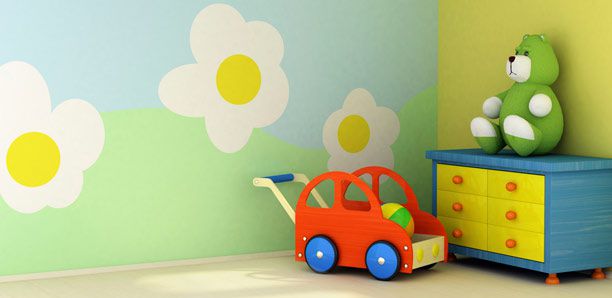Room decorating can cost a fortune, but with a bit of creativity it doesn’t have to. Some of the best spaces are those in which inexpensive materials and personal flare are combined creatively. Here’s ten tips which will help you make your child’s room look a million dollars, without spending much at all.
1. Buy paint at bargain prices
A lick of paint can make all the difference, but sometimes it can also cost a small fortune. But you can still paint a room on a budget. Look out for sales, and mis-tinted paint. When they tint the colour even slightly wrong, hardware store often sell the paint off at bargain prices- you can pay as little as quarter of the full price. While it may be difficult to find the same paint colour again if you need to do touch ups, with the money you save you’ll be able to buy a bigger pot and store it in the garage if you need to do touch-ups or want to paint matching bedroom accessories.
2. Find free bedroom furniture on the streets
One man’s trash is another man’s treasure and you’re bound to find bedroom furniture treasure in the street from time to time. Most councils do periodic pick-ups for large items like old beds and cupboards (which they then sometimes sell at second hand outlets). If you know when to look, you can pick up other people’s cast offs from the side of the road for nothing- all you’ll need is a vehicle to transport them home in. And if you plan it well, for example target the posh suburbs where people have enough money that they can discard perfectly good pieces of furniture, you can find furniture that’s in great condition. Even if you find things a bit run down, often all they need is bit of sanding and varnish or a lick of paint to look brand new.
3. Purchase bedroom furniture second hand
You can also find great furniture bargains at second hand shops and council recycling centres (the shop at the tip). Remember that second hand certainly doesn’t mean second best- you can find a good quality, sturdy piece of furniture second hand for the same price or less than you’ll find a flimsy, cheap version new at the shops. It will last longer and you might just find that unique piece that really reflects your child’s tastes.
4. Makeover old bedroom furniture
Before you start getting rid of old bedroom furniture, identify pieces which could be made-over with a lick of paint or a small addition. For example old curtains or bedding could be dyed or painted (this is especially good if they are a plain colour). Furniture like beds, drawers or cupboards can be made to look brand new (in a way which reflects your child’s tastes and style) with some varnish, creative painting or decorating.
5. Get creative with bedroom accessories
It’s often the bits and pieces that really make a room, the interesting pictures on the walls or the practical items like drawers that have been spruced up with a personal touch. Adding personal touches is also lots of fun and an opportunity to get creative with your child.
Wall accessories are easy for you and your child to make and they can be changed as often as you like, at little or no cost. You could hang colourful frames or paint borders in which your child can hang their own artworks. Use papier mache to make wall accessories that jut out, for example you could mould your faces, paint them and hang them on the wall (but this is best for older kids who have the patience to keep their face still while the paper dries). Stick your child’s favourite photos to the wall or add a photoboard which they can add and remove photos from any time they want to.
You can also add personal, creative touches to bedroom furniture without much effort. Think fancy door knobs or handles, for example in the shape of pirates if that’s what your child is into. You could add stickers to an old piece of bedroom furniture to match the room’s theme. Or make some stencils and grab a tin of paint and personalise your child’s bedroom suite with stencilled drawings to match the theme or colour.
6. Create a theme or feature wall
Painting just one wall over your child’s bedroom with a feature colour or themed picture can give a stunning result. But you’ll save money on paint and painting a single wall will take a fraction of the time.
7. Decorate so that redecorating is cheap and easy
Kids grow up fast and their ideas and favourites often tend to change fairly quickly too. Just because your child is totally into dinosaurs today, doesn’t mean that next week their favourite won’t be horses or the latest cartoon character. Your child’s mind will undoubtedly change more quickly than their bedroom decorations, so it’s important to decorate so that redecorating can be done simply and quickly as their ideas and favourites evolve. When decorating a child’s room it’s a good idea to:
- Have a basic design that is neutral and won’t age as fast as your children do. For example a neutral colour on the walls and furniture which can go with anything from dinosaurs to fairies.
- Incorporate display space into the basic design of the room, so the look and feel of the room can be easily change. Shelves for your child to display their favourite things like action figures or stuffed toys also allow them to redecorate their room every time they display new things. Frames or wall space for hanging pictures are also versatile, easy to change features of a room.
- Use your child’s toys, books and other practical items to make the room look good. Anything from their favourite colouring in book to their latest block creation can be used as an ornament to brighten up a child’s room.
- Paint sections of old furniture, instead of the whole piece. For example you could paint just the knobs or handles on drawers or a cupboard, or only the back wall of the bookshelf. You’ll save money on paint because you won’t need to use much (and might even be able to use leftovers), but the whole piece of furniture will have a fresh, new look.
- Use removable wall stickers to create features. They’re inexpensive and easy to put on and take off without damaging the paint underneath, so you’ll be able to redecorate easily when your child outgrows the sticker design.
8. Make your own wall shelves
 Wall shelves can be used in place of bookshelves and cupboards to stores books and all sorts of other kids’ things. Photo ledges are also a great way to store items your child wants on display. For example, they could have a photo ledge on which they display their favourite books (and change them every week or so, as favourites change or your child feels like redecorating). Displaying books, puzzles or other educational toys in a place where your child can reach them will also encourage them to pick them up and read, solve puzzles and play other educational games (and hopefully they’ll also work out that they can reach the shelf to put them back in place too!)
Wall shelves can be used in place of bookshelves and cupboards to stores books and all sorts of other kids’ things. Photo ledges are also a great way to store items your child wants on display. For example, they could have a photo ledge on which they display their favourite books (and change them every week or so, as favourites change or your child feels like redecorating). Displaying books, puzzles or other educational toys in a place where your child can reach them will also encourage them to pick them up and read, solve puzzles and play other educational games (and hopefully they’ll also work out that they can reach the shelf to put them back in place too!)
Shelves and photo ledges are relatively easy to construct- buy brackets from a hardware store to fix to the wall and use anything that’s strong and flat (for example a panel from an old cupboard that someone has left on the street) to make the shelf.
 |
Find out more about bedroom makeovers for kids |



 (6 votes, average: 4.33 out of 5)
(6 votes, average: 4.33 out of 5) 






